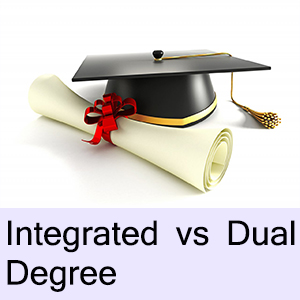How to decide between Dual and Integrated Degree?
 As we all know Education plays a vital role in shaping successful people. Many things have altered after the education system in India has got revolutionized and introduction of dual/integrated program is one of them. In order to expand the career growth and opportunities of the students, the education department has opened doors to the students to enroll with integrated degree programs being offered by a wide range of universities in India and across the world. The aim of this initiative is to make higher education more industry oriented. These programs include flexible and integrated courses in management and human resources discipline integrated with engineering programs.
As we all know Education plays a vital role in shaping successful people. Many things have altered after the education system in India has got revolutionized and introduction of dual/integrated program is one of them. In order to expand the career growth and opportunities of the students, the education department has opened doors to the students to enroll with integrated degree programs being offered by a wide range of universities in India and across the world. The aim of this initiative is to make higher education more industry oriented. These programs include flexible and integrated courses in management and human resources discipline integrated with engineering programs.
A Dual/integrated Degree Program is a concurrent degree program for students who wish to pursue two degrees at once, expand their networks, or learn something else that they do not have the foggiest idea about. Both integrated and dual degrees are an amalgamation of a graduate and postgraduate degree, for instance, B.Tech + M.Tech or BA LLB. But most of the students get confused while choosing between dual and integrated programs. Both these programs benefit the learner in their respective fields.
Leading institutes like IITs in the country have taken the key initiatives towards the induction of integrated programs. Thus, laying a trend for others to follow, the Indian Institutes of technologies (IITs) offer you a five-year term M.Tech dual degree course in various engineering branches of study.
The difference arises only when it comes to conferring of the degrees. In case of an integrated degree, a student gets one combined degree while in case of a dual degree, a student gets two different degrees from the same institute. There are some advantages and drawbacks of pursuing dual and integrated courses such as:-
Advantages of Dual and Integrated:
1. The obvious advantage is that it saves 1 year. The students get employment and start earning a year ahead of others.
2. The cost of education also reduces with the reduction in one year. There is no need to prepare for a separate entrance exam for doing the Master’s course.
3. B.Tech + MBA program gives management skills to an engineering student. It is an added advantage.
4. B.Tech + M.Tech program gives in-depth knowledge in the engineering domain, which is demanded in many industries.
5. The students can directly go to Ph.D. after the integrated or dual course in B.Tech + M.Tech
Drawbacks of Dual and Integrated:
1. The students are hindered from switching their career plan if they do not find the course interesting.
2. B.Tech + MBA make a student a generalist even in the domain of management. They cannot gain specialized knowledge in a particular domain of management.
3. In the job market, except in a few industries, the students from the Integrated/Dual Programme are treated on par with a Bachelor’s student.
4. The students have to pursue both bachelors and masters in the same college/university. They do not have the choice to pursue their master’s in a better institution than the one in which they pursue their bachelor’s.
The choice is mostly based on the interests of the students as both integrated and dual degree comes in various disciplines, from engineering to humanities. Both integrated, as well as dual degree courses, are found to be the finest examples of these varieties of courses available for students to study under one roof. It is true that any student availing either integrated or dual degree course can get two degrees and thereby will be able to save time.

